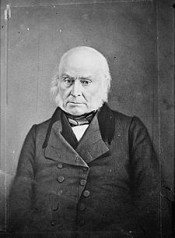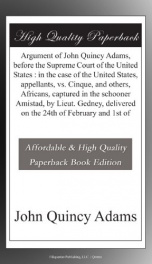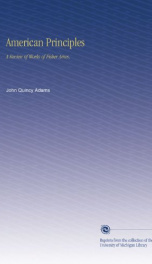Adams John Quincy

John Quincy Adams (July 11, 1767 – February 23, 1848) was the sixth President of the United States from March 4, 1825 to March 4, 1829. He was also an American diplomat and served in both the Senate and House of Representatives. He was a member of the Federalist, Democratic-Republican, National Republican, and later Anti-Masonic and Whig parties. Adams was the son of the second President John Adams and his wife Abigail Adams, the name "Quincy" having come from Abigail's maternal grandfather, Colonel John Quincy, after whom Quincy, Massachusetts is also named.[1][pn 1] He was a diplomat, involved in many international negotiations, and helped formulate the Monroe Doctrine as Secretary of State. As president he proposed a program of modernization and educational advancement, but was stymied by Congress. Adams lost his 1828 bid for re-election to Andrew Jackson. Adams was elected a U.S. Representative from Massachusetts after leaving office, the only president ever to do so, serving for the last 17 years of his life. In the House he became a leading opponent of the Slave Power and argued that if a civil war ever broke out the president could abolish slavery by using his war powers, which Abraham Lincoln partially did during the American Civil War in the 1863 Emancipation Proclamation. Adams was born on July 11, 1767, to John Adams and his wife and third cousin[2] Abigail Adams in what is now Quincy, Massachusetts. Quincy in 1767 was the "north precinct" of Braintree, Massachusetts; Quincy became incorporated as an independent town in 1792 and was named for John Quincy, just as John Quincy Adams had been. The John Quincy Adams birthplace is now part of Adams National Historical Park and open to the public. It is near Abigail Adams Cairn, marking the site from which Adams witnessed the Battle of Bunker Hill at age seven. In 1779 Adams began a diary that he kept until just before his death in 1848.[3] Adams first learned of the Declaration of Independence from the letters his father wrote his mother from the Second Continental Congress in Philadelphia. Much of Adams' youth was spent accompanying his father overseas. John Adams served as an American envoy to France from 1778 until 1779 and to the Netherlands from 1780 until 1782, and the younger Adams accompanied his father on these journeys. Adams acquired an education at institutions such as Leiden University. For nearly three years, at the age of 14, he accompanied Francis Dana as a secretary on a mission to St. Petersburg, Russia, to obtain recognition of the new United States. He spent time in Finland, Sweden, and Denmark and, in 1804, published a travel report of Silesia.[4] During these years overseas, Adams gained a mastery of French and Dutch and a familiarity with German and other European languages. He entered Harvard College and graduated in 1788, Phi Beta Kappa.[5] (Adams House at Harvard College is named in honor of Adams and his father.) He apprenticed as a lawyer with Theophilus Parsons in Newburyport, Massachusetts, from 1787 to 1789. He was admitted to the bar in 1791 and began practicing law in Boston. George Washington appointed Adams minister to the Netherlands (at the age of 26) in 1794 and to Portugal in 1796. He then was promoted to the Berlin Legation. When the elder Adams became president, he appointed his son in 1797 as Minister to Prussia at Washington's urging. There Adams signed the renewal of the very liberal Prussian-American Treaty of Amity and Commerce after negotiations with Prussian Foreign Minister Count Karl-Wilhelm Finck von Finckenstein. He served at that post until 1801. While serving abroad, Adams married Louisa Catherine Johnson, the daughter of an American merchant, in a ceremony at the church of All Hallows-by-the-Tower, London. Adams remains the only president to have a foreign-born First Lady. On his return to the United States Adams was appointed a commissioner of bankruptcy in Boston by a Federal District Judge. However, Thomas Jefferson rescinded this appointment. He again tried his hand as a lawyer, but shortly entered politics. John Quincy Adams was elected a member of the Massachusetts State Senate in April 1802. In November 1802 he lost in a congressional election where he was the Federalist candidate for a seat in the United States House of Representatives.[6] The Massachusetts General Court elected Adams as a Federalist to the U.S. Senate soon after, and he served from March 4, 1803, until 1808, when he broke with the Federalist Party. Adams, as a Senator, had supported the Louisiana Purchase and Jefferson's Embargo Act, actions which made him very unpopular with Massachusetts Federalists. The Federalist-controlled Massachusetts Legislature chose a replacement for Adams on June 3, 1808, several months early. On June 8, Adams broke with the Federalists, resigned his Senate seat, and became a Democrat-Republican.[7] While a member of the senate Adams also served as a professor of rhetoric at Harvard University.[8] New President James Madison appointed Adams as the first ever United States Minister to Russia in 1809. Three years later Adams, still in Russia, reported back to the United States the news of Napoleon's invasion of Russia in 1812 and his disastrous retreat. In 1814, Adams was recalled from Russia to serve as chief negotiator of the U.S. commission for the Treaty of Ghent, which ended the War of 1812 between the United States and Great Britain. Finally, he was sent to be minister to the Court of St. James's (Britain) from 1815 until 1817.[7] Adams served as Secretary of State in the Cabinet of President James Monroe from 1817 until 1825, a tenure during which he was instrumental in the acquisition of Florida. Typically, his views concurred with those espoused by Monroe. As Secretary of State, he negotiated the Adams-Onís Treaty and wrote the Monroe Doctrine, which warned European nations against meddling in the affairs of the Western Hemisphere. Adams' interpretation of neutrality was so strict that he refused to cooperate with Great Britain in suppressing the slave trade. On Independence Day 1821, in response to those who advocated American support for Latin America's independence movement from Spain,[9] Adams gave a speech in which he said that American policy was moral support for but not armed intervention on behalf of independence movements, stating that America "goes not abroad in search of monsters to destroy."[10] Adams ran against four other candidates in the presidential election of 1824: Speaker of the House Henry Clay of Kentucky, Secretary of the Treasury William H. Crawford of Georgia, U.S. Senator Andrew Jackson of Tennessee, and Secretary of War John C. Calhoun of South Carolina. After Crawford suffered an incapacitating stroke, there was no clear favorite. In the election, no candidate had a majority of the electoral votes (or of the popular votes), although Jackson had been the winner of a plurality of both. Under the terms of the Twelfth Amendment, the presidential election was thrown to the House of Representatives to vote on the top three candidates: Jackson, Adams, and Crawford. Clay had come in fourth place and thus was ineligible, but he retained considerable power and influence as Speaker of the House. Crawford was unviable due to the stroke. Clay's personal dislike for Jackson and the similarity of his American System to Adams' position on tariffs and internal improvements caused him to throw his support to Adams, who was elected by the House on February 9, 1825, on the first ballot. Adams' victory shocked Jackson, who had gained the plurality of the electoral and popular votes and fully expected to be elected president. When Adams appointed Clay as Secretary of State—the position that Adams and his three predecessors had held before becoming President—Jacksonian Democrats were outraged, and claimed that Adams and Clay had struck a "corrupt bargain." This contention overshadowed Adams' term and greatly contributed to Adams' loss to Jackson four years later, in the 1828 election. Adams served as the sixth President of the United States from March 4, 1825, to March 3, 1829. He took the oath of office on a book of laws, instead of the more traditional Bible, to preserve the separation of church and state.[11][12] During his term, he worked on developing the American System, consisting of a high tariff to support internal improvements such as road-building, and a national bank to encourage productive enterprise and form a national currency. In his first annual message to Congress, Adams presented an ambitious program for modernization that included roads, canals, a national university, an astronomical observatory, and other initiatives. The support for his proposals was limited, even from his own party. His critics accused him of unseemly arrogance because of his narrow victory. Most of his initiatives were opposed in Congress by Jackson's supporters, who remained outraged over the 1824 election. Nonetheless, some of his proposals were adopted, specifically the extension of the Cumberland Road into Ohio with surveys for its continuation west to St. Louis; the beginning of the Chesapeake and Ohio Canal, the construction of the Delaware and Chesapeake Canal and the Portland to Louisville Canal around the falls of the Ohio; the connection of the Great Lakes to the Ohio River system in Ohio and Indiana; and the enlargement and rebuilding of the Dismal Swamp Canal in North Carolina. One of the issues which divided the administration was protective tariffs. Henry Clay was a supporter, but Adams´ Vice President John C. Calhoun was an opponent. The position of Adams was unknown, because his constituency was divided. After Adams lost control of Congress in 1827, the situation became more complicated. By signing into law the Tariff of 1828 (also known as the Tariff of Abominations), extremely unpopular in the South, he limited his chances to achieve more during his presidency. Adams and Clay set up a new party, the National Republican Party, but it never took root in the states. In the elections of 1826, Adams and his supporters lost control of Congress. New York Senator Martin Van Buren, a future president and follower of Jackson, became one of the leaders of the senate.
do you like this author?
What readers are saying
What do you think? Write your own comment on this book!
write a commentWhat readers are saying
What do you think? Write your own comment on this author!
write a commentBook list

Ex-President John Quincy Adams in PittsburghAddress of Welcome,by Wilson McCandless,and Mr. AdamsReply; together with a letter from Mr. Adams Relative toJudge Brackenridge's "Modern Chivalry."
Series:
Unknown
Year:
Unknown
Raiting:
4.5/5
Show more
add to favoritesadd In favorites

correspondence between john quincy adams president of the united states and se
Series:
Unknown
Year:
Unknown
Raiting:
5/5
Show more
add to favoritesadd In favorites

correspondence between john quincy adams esquire president of the united state
Series:
Unknown
Year:
Unknown
Raiting:
3/5
Show more
add to favoritesadd In favorites
Book list

Ex-President John Quincy Adams in PittsburghAddress of Welcome,by Wilson McCandless,and Mr. AdamsReply; together with a letter from Mr. Adams Relative toJudge Brackenridge's "Modern Chivalry."
Series:
Unknown
Year:
Unknown
Raiting:
4.5/5
Show more
add to favoritesadd In favorites

correspondence between john quincy adams president of the united states and se
Series:
Unknown
Year:
Unknown
Raiting:
5/5
Show more
add to favoritesadd In favorites

correspondence between john quincy adams esquire president of the united state
Series:
Unknown
Year:
Unknown
Raiting:
3/5
Show more
add to favoritesadd In favorites

argument of john quincy adams before the supreme court of the united states in
Series:
Unknown
Year:
Unknown
Raiting:
3/5
Argument of John Quincy Adams, before the Supreme Court of the United States : in the case of the United States, appellants, vs. Cinque, and others, Africans, captured in the schooner Amistad, by Lieut. Gedney, delivered on the 24th of February and 1st of
Show more
add to favoritesadd In favorites

argument of john quincy adams before the supreme court of the united states i
Series:
Unknown
Year:
Unknown
Raiting:
5/5
Show more
add to favoritesadd In favorites

an oration delivered before the inhabitants of the town of newburyport at their
Series:
Unknown
Year:
Unknown
Raiting:
4/5
This volume is produced from digital images created through the University of Michigan University Library's large-scale digitization efforts. The Library seeks to preserve the intellectual content of items in a manner that facilitates and promotes a variety of uses. The digital reformatting process results in an electronic version of the original text that can be both accessed online and used to create new print copies. The Library also understands and values the usefulness of print and makes reprints available to the public whenever possible. This book and hundreds of thousands of others can be found in the HathiTrust, an archive of the digitized collections of many great research libraries. For access to the University of Michigan Library's digital collections, please see http://www.lib.umich.edu and for information about the HathiTrust, please visit http://www.hathitrust.org
Show more
add to favoritesadd In favorites

an oration addressed to the citizens of the town of quincy on the fourth of jul
Series:
Unknown
Year:
Unknown
Raiting:
3.5/5
Show more
add to favoritesadd In favorites

an oration addressed to the citizens of the town of quincy on the fourth of ju
Series:
Unknown
Year:
Unknown
Raiting:
4.5/5
Show more
add to favoritesadd In favorites

an eulogy on the life and character of james monroe fifth president of the uni
Series:
Unknown
Year:
Unknown
Raiting:
4/5
Show more
add to favoritesadd In favorites

an eulogy on the life and character of james madison delivered at the reques
Series:
Unknown
Year:
Unknown
Raiting:
3.5/5
Show more
add to favoritesadd In favorites

an eulogy on the life and character of james madison delivered at the requ
Series:
Unknown
Year:
Unknown
Raiting:
3/5
Show more
add to favoritesadd In favorites

an eulogy on the life and character of james monroe fifth president of the un
Series:
Unknown
Year:
Unknown
Raiting:
3/5
EULOGY.Among the peculiarities affecting the condition of human existence, in a community formed within the period allotted to the life of man, is the state of being exclusively belonging to the individuals who assisted in the formation of that community. Three thousand years have elapsed since the Monarch of Israel, who, from that time, has borne the reputation of the wisest of men, declared that there was no new thing under the sun. And then, as now, the assertion, confined to the operations of nature, to the instincts of animal life, to the primary purposes, and innate passions of human kind, was, and is, strictly true. Of all the illustrations of the sentiment given by him, the course is now as it was then. One generation passcth away, and another generation cometh. To the superficial observation of the human eye, the Sun still ariseth and goeth down ; the wind tvhirleth about continually; all rivers run into the sea, which yet is not full; and all things are full of labour, whicAbout the Publisher Forgotten Books is a publisher of historical writings, such as: Philosophy, Classics, Science, Religion, History, Folklore and Mythology.Forgotten Books' Classic Reprint Series utilizes the latest technology to regenerate facsimiles of historically important writings. Careful attention has been made to accurately preserve the original format of each page whilst digitally enhancing the difficult to read text. Read books online for free at www.forgottenbooks.org
Show more
add to favoritesadd In favorites

an address delivered at the request of a committe of the citizens of washington
Series:
Unknown
Year:
Unknown
Raiting:
2.5/5
Show more
add to favoritesadd In favorites

american principles a review of works of fisher ames
Series:
Unknown
Year:
Unknown
Raiting:
3/5
This volume is produced from digital images created through the University of Michigan University Library's preservation reformatting program. The Library seeks to preserve the intellectual content of items in a manner that facilitates and promotes a variety of uses. The digital reformatting process results in an electronic version of the text that can both be accessed online and used to create new print copies. This book and thousands of others can be found in the digital collections of the University of Michigan Library. The University Library also understands and values the utility of print, and makes reprints available through its Scholarly Publishing Office.
Show more
add to favoritesadd In favorites

address to the norfolk county temperance society at their meeting at quincy 2
Series:
Unknown
Year:
Unknown
Raiting:
3.5/5
Show more
add to favoritesadd In favorites

address of john quincy adams to his constituents of the twelfth congressional d
Series:
Unknown
Year:
Unknown
Raiting:
2.5/5
Show more
add to favoritesadd In favorites

a history of auburn theological seminary 1818 1918
Series:
Unknown
Year:
Unknown
Raiting:
3.5/5
Show more
add to favoritesadd In favorites

a dissertation upon the nature and intention of homers fables relating to the g
Series:
Unknown
Year:
Unknown
Raiting:
2.5/5
Show more
add to favoritesadd In favorites
What readers are saying
What do you think? Write your own comment on this author!
write a commentif you like Adams John Quincy try:
readers also enjoyed
What readers are saying
What do you think? Write your own comment on this author!
write a commentGenre
if you like Adams John Quincy try:
readers also enjoyed
Do you want to exchange books? It’s EASY!
Get registered and find other users who want to give their favourite books to good hands!

